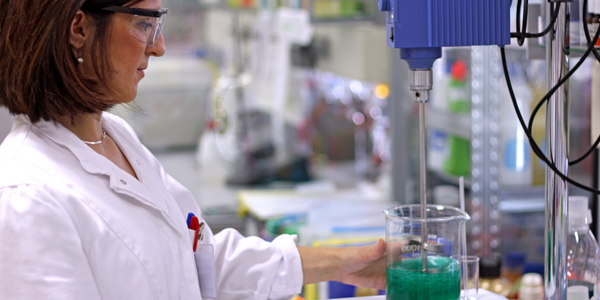Technology Category
- Infrastructure as a Service (IaaS) - Cloud Computing
- Sensors - Temperature Sensors
Applicable Industries
- Chemicals
- Education
Applicable Functions
- Facility Management
- Product Research & Development
Use Cases
- Inventory Management
- Virtual Reality
Services
- Hardware Design & Engineering Services
About The Customer
Scuola Normale Superiore (SNS) is a public institution of university education that was formally founded on October 18, 1810, by a Napoleonic decree. It is at the forefront of global research, with students selected only on the basis of merit. Lessons are held in seminar form, and an intimate link connects education and research. SNS research activities are traditionally divided into two primary areas: Arts and Sciences. Graduates include scientists, politicians, and intellectuals, many of whom have made remarkable achievements in their fields. The SNS Faculty of Science hosts several internationally recognized research groups in Biology, Chemistry, Physics, and Mathematics, which are involved in theoretical and applied research in nearly every scientific field.
The Challenge
Scuola Normale Superiore (SNS), a public institution of university education at the forefront of global research, has a mission to convert IT innovation into opportunities in computational science. The SNS Faculty of Science hosts several internationally recognized research groups in Biology, Chemistry, Physics and Mathematics, which are involved in theoretical and applied research in nearly every scientific field. To support state-of-the-art research investigations with a strong theoretical/computational background, SNS established DREAMSLab, a center dedicated to high-performance computing (HPC) and cutting-edge visualization and virtual reality techniques. The core of the DreamsHPC computational facility is a Dell cluster with over 2600 cores monitored in real time. However, given the complexity of the simulations running on the DreamsHPC cluster, it was necessary to carefully plan the software layer to be deployed on the infrastructure. The key requirements were overall ease of management of the already-present heterogeneous hardware, as well as significant simplification for the addition of new computing nodes in the existing structure and the distribution of computational programs on the nodes.
The Solution
For the HPC workload management, SNS chose Altair’s PBS Professional, an industry-leading product with thousands of users and support in 20 countries worldwide. PBS Professional was chosen for its efficiency, flexibility, and robustness. It allows for the allocation of available computational power in a self-consistent way by means of a queue-label for each node-family. With PBS Professional, the HPC users at SNS now have dynamically balanced access to the available computational resources to run their jobs in up to a month of wall-clock time. Moreover, the management of the submitted computational instances is completely transparent to the user, which is important because users want to follow the status of their simulations without losing time interacting with the OS environment. As a result of the PBS Professional installation, SNS has seen a significant increase in its occupation rate, with a 50% higher cluster utilization over the previous configurations.
Operational Impact
Quantitative Benefit

Case Study missing?
Start adding your own!
Register with your work email and create a new case study profile for your business.
Related Case Studies.

Case Study
Honeywell - Tata Chemicals Improves Data Accessibility with OneWireless
Tata was facing data accessibility challenges in the cement plant control room tapping signals from remote process control areas and other distant locations, including the gas scrubber. Tata needed a wireless solution to extend its control network securely to remote locations that would also provide seamless communication with existing control applications.

Case Study
Advanced Elastomer Systems Upgrades Production
In order to maintain its share of the international market for thermoplastic elastomers AES recently expanded its Florida plant by adding a new production line. While the existing lines were operating satisfactorily using a PROVOX distributed control system with traditional analog I/O, AES wanted advanced technology on the new line for greater economy, efficiency, and reliability. AES officials were anxious to get this line into production to meet incoming orders, but two hurricanes slowed construction.
Case Study
Wireless GPS Tracking & Security Monitoring
Enhancing the security of hazardous freight and ensuring compliance with Homeland Security’s Transportation Security Administration mandate that all trains carrying chemicals capable of creating a toxic inhalation condition are equipped with on-board safety monitoring systems.

Case Study
Field Device Asset Management For Chemical Company in China
Chinese chemical subsidiary of multinational corporation serves customers throughout the world. Sales offices and research and technology centers are strategically located to provide rapid response to customer requests. Just two workers were assigned to maintain thousands of intelligent instruments in three production units, so they could do little more than react to device issues as they appeared. This costly maintenance method inevitably led to unexpected downtime when a critical instrument failed. Plant management recognized the need to change from reactive to predictive maintenance for all assets, including instruments and control valves, but help was needed in implementing such a technology-based initiative.

Case Study
Industrial Workforce Mobility for Improved Safety & Operations
Huntsman Corporation, a global manufacturer and marketer of differentiated chemicals, undertook an aggressive program to eliminate injuries, product defects, and environmental releases at their Port Neches facility. Termed “Project Zero”, this program required a completely mobile solution to empower operations and maintenance personnel to capture defects, track work progress and make process and safety related decisions in real-time.




